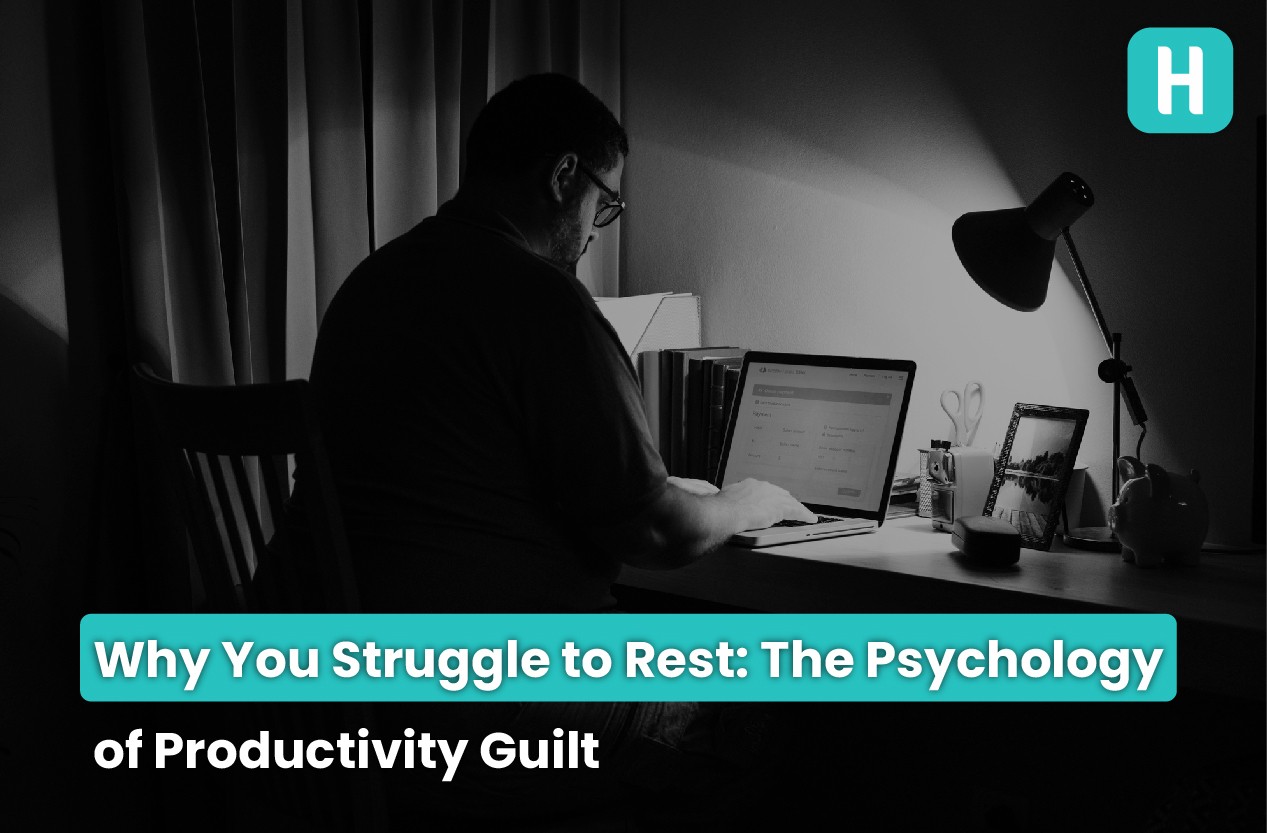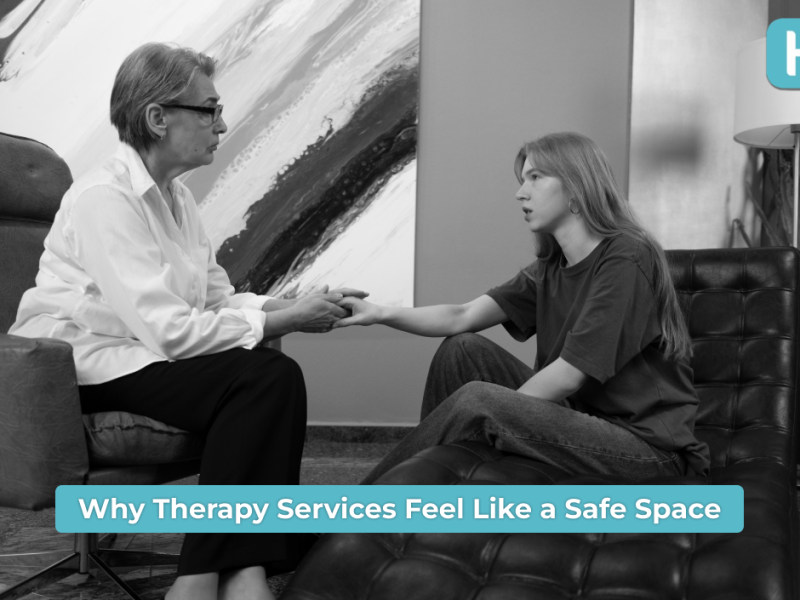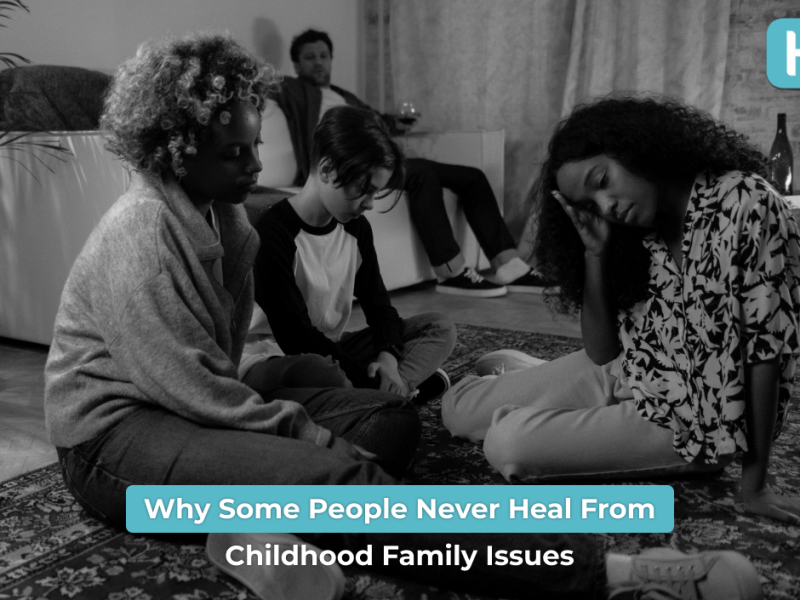“Why does resting feel like failure?”
Imagine this.
It’s Sunday afternoon. The chores are done. Your calendar is blank. You finally sit down… but the second you exhale, it hits you:
- “You’re wasting time.”
- “You could be getting ahead.”
- “You don’t deserve to relax.”
You grab your phone, check your email. Maybe scroll through your to-do list.
Suddenly, rest feels like a luxury you haven’t earned.
That feeling?
It’s not laziness.
It’s Productivity Guilt — and it’s wrecking your mental health.
What makes this worse? Most of us don’t even realize we’re trapped in it.
This isn’t just a personality quirk. It’s psychological conditioning.
And it’s one of the quietest forms of self-abandonment we go through — especially if you’ve grown up being praised for your performance instead of your presence.
Hidden Reality: Why You Can’t Sit Still
You’re not imagining it.
You’re not “bad at relaxing.”
You’re just carrying a belief system that equates rest with worthlessness.
The truth is, we live in a world where:
- Taking a break is branded as “falling behind”
- Naps are frowned upon but burnout is glorified
- Being “productive” is more celebrated than being mentally healthy
This is where the psychology of productivity guilt takes root. You don’t feel guilty because you’re lazy — you feel guilty because you were taught to only feel valuable when you’re doing something.
Let’s be honest — that’s psychological damage, not motivation.
What Is Productivity Guilt? (And Why It’s Not Your Fault)
Productivity guilt is that overwhelming sense of shame, anxiety, or discomfort when you’re not working, achieving, or “being useful.”
It creeps in when you:
- Take a nap
- Watch a show guilt-free
- Say no to overtime
- Sleep in past 8 AM
If you’re wondering what is productivity guilt, here’s the raw truth:
It’s not just a bad habit. It’s often a trauma response. When love, validation, or safety were tied to your performance growing up — your brain starts confusing productivity with survival. This is more common than you think.
And tragically, it leaves people burned out, anxious, and ashamed to rest.
- 65% of adults admit they feel guilty when resting — even when they’re sick.
- 78% of millennials report feeling “like a failure” if they don’t achieve something daily.
- Burnout has increased by 35% post-pandemic — mostly due to internalized pressure to be constantly productive.
This isn’t ambition. This is emotional exhaustion hiding behind task lists.
Still think you’re just “bad at relaxing”?
Psychology of Productivity Guilt — And Why You Feel It So Deeply
Here’s a harsh truth: If you feel guilty for resting, you were likely never taught to feel safe doing nothing.
The psychology of guilt tells us that shame often emerges when we violate our internal moral codes. But here’s where it gets dangerous:
What if your “moral code” has been shaped by hustle culture, toxic parents, or a system that celebrates overwork?
- You were praised for straight A’s — not for joy.
- You were told hard work pays off — but rest makes you weak.
- You saw your parents sacrifice sleep, peace, and health — and learned that hustle is love.
No wonder productivity guilt feels like identity.
Silent Struggle of Productivity (And Why It’s Destroying Your Mental Health)
Let’s call it what it is:
The struggle of productivity is not noble. It’s a slow, silent breakdown.
Signs you’re in it:
- You can’t enjoy rest without guilt.
- You feel anxious when not “doing something.”
- You look down on others who “aren’t working hard enough.”
- You panic when your schedule is free.
- You feel your worth plummet when you’re unproductive.
This isn’t normal. This is what happens when guilt replaces guidance.
And this is where healing begins.
How to overcome guilt Without Losing Your Drive?
You don’t have to become a lazy person to escape guilt. You just need to redefine what success feels like.
Here’s how to begin:
1. Name the Guilt
Most people can’t heal from something they don’t admit. Say it aloud:
“I feel guilty for resting — and I don’t know why.”
You’ve just broken the first chain.
2. Understand Where It Came From
Trace the belief. Who made you believe rest = weakness? Was it a parent? A boss? A school system? Trauma? Once you know where the guilt came from, you stop letting it control you.
3. Reframe Your Definition of Productivity
Rest is productive. It regenerates your brain, stabilizes your hormones, and protects your immune system.
Start asking:
- “What would happen if I allowed rest to be powerful?”
- “What if doing nothing is the very thing that heals me?”
This simple switch can silence that nagging voice inside.
4. Practice Rest Like a Ritual, Not a Reward
Don’t treat rest as something you “earn.” Treat it as something you need — like food or water.
Create sacred rituals:
- A 10-minute nap with music
- Phone-off Sundays
- Nature walks with no headphones
Watch how your nervous system starts trusting stillness again.
5. Seek Support When Guilt Feels Overwhelming
You’re not meant to heal alone.
Whether it’s a therapist, support group, or safe community — lean in.Platforms like Helply offer therapy that teaches you how to overcome productivity guilt, rewire your beliefs, and build habits that nourish you instead of deplete you.
You’re Not Broken — You’re Healing from a System That Burned You Out
Here’s the truth no one told you:
If you’ve ever cried because you “didn’t do enough,”If you’ve felt worthless on a “lazy day,”If you’ve hustled through illness or heartbreak because rest felt unacceptable…You’re not weak.You’re not a failure.You are living proof that productivity guilt is real — and harmful.But you don’t have to carry it forever.
You Can Overcome from Guilt and Finally Rest Without Shame
Yes, you can overcome from guilt.Yes, you can be successful and rested.Yes, you are still valuable — even when you’re not “doing anything.”The healing starts when you stop apologizing for your humanity.
The Guilt Nobody Talks About
Let’s talk about something that people rarely admit out loud:
“Sometimes I feel guilty even when I’m doing something fun.”
A peaceful coffee break? Still scrolling emails.
A vacation? Still thinking about work.
A nap? Waking up with anxiety.
That’s not just overthinking. That’s rest guilt.You’ve been conditioned so deeply by the pressure to perform that even joy feels like slacking off.And here’s the shocking reality: this guilt can turn into chronic stress, digestive issues, immune dysfunction, and even emotional numbness.You’re not just tired — you’re emotionally drained by the weight of expectations you never agreed to carry.
When Productivity Becomes a Performance, Not a Purpose?
If you’ve ever said, “I’ll rest once I’ve done enough,” let me ask you something:
Have you ever actually reached that “enough”? No. Because Productivity Guilt doesn’t deal in logic — it deals in lack.
It whispers:
- “You’re falling behind.”
- “Someone else is doing more.”
- “You’re wasting your potential.”
This cycle becomes a never-ending struggle of productivity where you:
- Work to rest
- Rest to work better
- And never truly feel at peace
You’re trapped in a cycle that rewards burnout and punishes balance.
Real Stories. Real Pain.
Fatima, 29, an interior designer in Karachi:
“Even on Sundays, I feel this pressure to check in with clients. If I don’t, I feel… lazy. Like I’m not trying hard enough. I know it’s wrong, but I can’t help it.”
Zain, 35, a startup founder in Lahore:
“I haven’t taken a real day off in 3 years. I tried once, but I couldn’t relax. My mind kept reminding me of unfinished tasks. I felt like a fraud.”
These are not exceptions. These are the norm in a society where burnout is branded as ambition.
How This Guilt Slowly Builds Up?
The psychology of productivity guilt is layered. It often starts small, but over time it becomes a mental fortress.
Here’s how it often forms:
1. Praise Based on Achievement
As children, we’re praised when we win, when we achieve, when we perform. Rarely are we praised for simply being.
2. Fear-Based Motivation
“If you don’t work hard, you’ll fall behind.” This fear becomes the fuel — not passion, not curiosity.
3. Toxic Comparisons
We scroll social media and see “hustle 24/7” glorified. We compare our rest with someone else’s results. And we feel behind.
4. Work Culture
Most corporate systems reward over-performers with more work — not balance. You become the “go-to” person, but at what cost?
Eventually, Productivity Guilt becomes your identity. You don’t know who you are without the next task, the next goal, the next pressure.
It’s Okay to Be More Than Just Busy
Repeat this to yourself:
- “I am not just a to-do list.
- I am not just an output machine.
- I am not just what I accomplish.”
You are joy. You are connection. You are rest. You are enough. Even when you’re doing absolutely nothing. You don’t have to keep proving your worth with productivity. Because your worth was never up for debate.
Signs You Need a Break (That You Might Be Ignoring)
Here are some quiet warning signs that productivity guilt has taken over:
- You feel irritable when you’re not busy
- You avoid rest because it makes you anxious
- You feel physical tension when you try to slow down
- You can’t stop multitasking — even during leisure
- You start new projects before finishing the last ones
- You feel ashamed when others ask, “What did you do today?” and your answer is “nothing”
These are not personality traits. They’re survival responses. They are the symptoms of a mind that’s been in overdrive for too long.
How to Think Differently and Still Stay Ambitious?
You don’t need to reject ambition to release guilt. You just need to rebuild balance.
✅ Strategy 1: Schedule Guilt-Free Rest
Block time on your calendar labeled: “Not for Productivity.”
Yes, schedule nothing — and protect it like a meeting.
At first, guilt will show up. Let it. Sit with it. Don’t run from it.
✅ Strategy 2: Redefine Self-Worth
Your value is not determined by:
- Your KPIs
- Your inbox status
- Your income
Your value is inherent. Internalize that through affirmations, therapy, and radical self-kindness.
✅ Strategy 3: Normalize Saying “No”
Saying “No” doesn’t make you unprofessional. It makes you sustainable.
The more you say “No” to guilt-driven tasks, the more space you create for joy, creativity, and peace.
✅ Strategy 4: Start Small with Self-Trust
Start by giving yourself 15 minutes a day to rest — phone off, to-do list out of reach.
Train your nervous system to believe that nothing will collapse if you slow down.
🤝 Let Go. Slowly. Safely.
Healing from productivity guilt doesn’t mean you stop caring. It means you stop punishing yourself for being human. The goal isn’t to do nothing. It’s to learn how to rest without guilt. To enjoy life without earning it. To feel peace without productivity. This isn’t laziness. This is liberation.
Words We Believe About Ourselves
Let’s bring this full circle by acknowledging what we’re really overcoming here:
- Guilt — the one you carry in silence
- Overcome from guilt — by choosing rest over reward
- Psychology of guilt — because this is deeper than discipline
- Struggle of productivity — the invisible burnout we glamorize
- Rest guilt — that tension in your chest every Sunday
- Productivity — not the enemy, but not the only identity
These aren’t buzzwords. These are the battlefields many of us walk on daily.
You Deserve to Be Free From This
You’re not here to prove. You’re here to live. To feel. To rest. To breathe. To just be. The world will tell you that you need to hustle to matter. But healing will teach you something far more powerful:
You were always enough — even on your slowest day.
How Helply Can Support Your Healing Journey?
At Helply, we understand that behind every overachiever is a wounded inner child — tired, anxious, and craving peace.we know you’ve spent too many nights lying in bed, feeling like you didn’t do “enough.”
That’s why we offer:
- Culturally sensitive therapists who understand guilt
- Emotional tools to help you redefine success
- Support for burnout, anxiety, and work addiction
- It’s time to stop chasing approval and start chasing balance.
- Therapists trained in work-related anxiety
- Mindfulness tools for high-performers
- Practical help to overcome productivity guilt for good
🌿 Choose rest. Choose healing. Choose Helply.
👉 Because peace isn’t found in more work. It’s found in healing.
You don’t need more apps. You need compassion. Let us walk you back to yourself.
Let’s Go Over It One More Time
- What is productivity guilt? — It’s the deep discomfort around rest, rooted in trauma and societal pressure
- The psychology of productivity guilt — This guilt isn’t laziness; it’s conditioning
- How to overcome productivity guilt — Through small shifts, therapy, boundaries, and self-compassion
- Why the struggle of productivity is not noble — It’s a symptom of deeper wounds
- How to rest without guilt — By letting go of old stories and learning to trust yourself again
FAQs
- What is productivity guilt?
Productivity guilt is the emotional shame or anxiety experienced when resting or not working, rooted in beliefs that equate self-worth with constant achievement.
- Why do I feel guilty when I rest?
Because culture, trauma, or upbringing conditioned you to feel valuable only when you’re productive. Your brain associates rest with failure or danger.
- Is productivity guilt real psychology?
Yes. The psychology of productivity guilt shows links to perfectionism, trauma, anxiety, and people-pleasing tendencies.
- How can I overcome productivity guilt?
Start by identifying where it came from, challenging those beliefs, reframing rest as productive, and building guilt-free rest rituals.
- Can therapy help with this guilt?
Absolutely. Therapy offers tools to rewire thought patterns and rebuild a healthy relationship with rest and productivity.
- Is this common among high achievers?
Yes. In fact, the more “successful” you are, the more vulnerable you may be to rest guilt — because your identity is tied to performance.
- What is the first step to overcoming productivity guilt?
Awareness. Once you name it, you can face it. Then follow up with small, daily acts of guilt-free rest.
- Can this guilt be passed down generationally?
Yes. Many South Asian and Middle Eastern families unconsciously pass down shame-based values where rest equals laziness.
- How long does it take to unlearn this?
It varies. But with consistent effort, therapy, and compassion, you can start feeling better within weeks.
- What’s one thing I can start today?
Give yourself permission. Write a note: “Rest is my right.” Stick it where you’ll see it. Let that belief grow.




